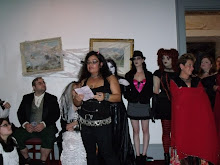David Kopp, “Writing Empty Like and Open Hand.” Part III
Plenary address given at Just Write, writers conference at Biola University, July 28-31, 1991
(3) We write empty like an open hand to live the story of redemption. This is the story of the chameleon. The chameleon is God’s joke. The chameleon is a disaster. The chameleon proves to us that God has a very Jewish sense of humor. The African chameleon is slow, dull, often invisible, and boring. The chameleon makes a great pet for boys because girls are scared of chameleons. At my school, most of the boys had chameleons in their pockets. My chameleon was so boring I never named him.
His body is a wreck. He has very spindly legs. His toes are splayed. He has this really ugly head with eyeballs that bulge out. On the very ends of the eyeballs are these little tiny eyes and they have little eyelids and they are blinking. And God made them so their eyeballs could go different directions. The only reason God did that is so the chameleon could live in a state of constant anxiety. Because he can see all the trouble coming his way, but he knows he can’t outrun it. He lives in a state of great terror.
The chameleon, in African folklore, has always wanted to be a lion. The chameleon wants to roar. The chameleon is also unable to make any sound. One day the snake comes to the chameleon and says,
“God made you small so that you would not terrify the mountains and they would fall on us. And you would terrify the lion and he would eat us. God made you small.”
Well, if you can imagine a chameleon the size of a lion turning bright colors. When they get angry, their neck frills bulge out and they’re orange striped and they turn black, and their ear flaps come up. Can you imagine an animal the size of a lion doing that?
The chameleon learns to live with his problem, which is ugliness. And out of that comes another saying that goes like this:
“If your face is ugly, learn to sing.”
The chameleon is the singer and the storyteller in the animal kingdom in many African tribes. This is what’s neat about it, this is my point: the chameleon tells everyone else’s story. And when he’s doing that, he weaves meanings for them.
He weaves meanings. He tells them what’s significant about their lives. He sings their life to them. He sings meaning into their life. I think as writers that’s what we do. We become, we are part of a process that speaks meaning into other people’s lives. Not from a distance. We are intertwined with their lives. And we speak meaning to them. We name. Our gift is words. We name things. We name feelings. That’s when someone reads what you write and says, “Yeah, that’s what it feels like.” There’s a recognition going on because your gift into their life is to put words to something, to name something.
It’s like when Nathan came to David and said, “You’ve named this baby Solomon. But God has a name for this child, it’s Jeddediah: Loved of God.”
What an incredible picture of grace that God would send a man to David and say, “I have a name for your son that has come out of all this tragedy and foolishness in your life. And his name is Loved By Me.”
We do that for our readers. We name things—name truths, they don’t have words for. They don’t have words for. This is our gift to them. I think it is also our gift to God. God needs our words.
A japanese theologian said it this way, his name is Kazo Kitumori:
“The heart of the gospel is the pain of God.”
He is writing about Jeremiah. You know, God needed Jeremiah. God needed Jeremiah to wail. Because God felt grief. God felt incredible pain. God felt anger. God felt despair. And he picked Jeremiah his prophet to say those words, not just to say them, to feel them, to live them before his people. And if you read the book of Lamentations, Jeremiah starts out saying, “This is how God feels.” At the beginning of chapter three, Jeremiah says, “This is how Jeremiah feels.” It’s all mixed up. It’s all one thing. Jeremiah is living out the story of redemption to his people. Jeremeiah is letting those people know when Jerusalem is falling all around them, that God is in deep grief with them. What he has given them is the gift of words. God words through him.
God needs our words. He needs them to speak himself into our generation. It is something we can give God. We find meanings for our readers. We incarnate the gospel to them. In this process something wonderful happens, this is the story of redemption. We, as writers, we’re changed. We meet God. The place to meet God in the Old Testament, a wonderful place, is in the prophets. Have you ever read Isaiah, is it, chapter six?
“I saw the Lord high and lifted up.”
And we as His ministers, we’re Word ministers. We meet God. He comes to us in our place of desolation, our place of need. It’s like the last verse in Psalm 30:
“He himself will redeem Israel.”
I love that, whatever that is grammatically. Rex will have to help you out. You know that repetition. What’s the word for that? Reflexive pronoun. Yes, He himself. The emphasis is on God, not what He is going to do, but God’s presence will redeem us. And that is the gift to us. As we are open before God and receptive to Him, God’s presence comes to us.
There is something else that’s wonderful. We are unable to be bearers of the Gospel without being changed ourselves. It doesn’t work. Do you know that God has no plan for His message in your life apart from you the messenger. I don’t believe it. God will change you. If you give yourself to Him, to be a carrier of His words to people. To express God in this age, God will change you. God will work in you, God will bring healing to you. I’ve seen it in my own life. We cannot be carriers of grace without being wet with grace. Without being rich with the gospel. We cannot set other people free, with the message of the gospel, without ourselves being set free.
It doesn’t happen as quickly as we’d like. God is LATE. God, he’s late. He’s always late. Too late for my schedule. But in that need, that longing that many of us live with for many years. How many years I’ve cried out to God in my journals, Lord I just want to be healed. I want to be healed. I need to be healed. Please come to me. And you’ve read that so many times in the Psalms, where we seek after God this is our natural state. We seek after God. But as we carry God’s word to His people, as we stand before Him with our whole hearts, with open hands, something wonderful happens. We’re changed. We are healed. We are set free. In our darkness, God’s light shines.
Let’s pray: Lord, I thank you for this opportunity to stand before these dear people and be honest with them about the things in my life that have been hard, that have even been impossible. That I’ve given to you. And Lord, I am privlidged to stand here and pray for them, and on their behalf. I pray for those in this group that feel empty before you and that yet feel you are asking them to speak. Lord, into that need and that want, that they are holding out faithfully to you everyday, I pray dear God, that you would put something precious. I pray that you would fill them with every good thing. With kingdom things, not with the stuff of this earth. And for Lord, Lord, for those in this group that are full of many things that are good, that aren’t the best, that aren’t your destiny for them, I pray Lord that they would submit to you as you peel their fingers off of these things. That they could let go of what is not their destiny before you and be willing to be open handed before you and to wait for you to come. And Lord for those who are already in ministry for you, who are conduits of your grace, of your power, of your message of life to this world, Lord bless them. Make them prophets in your Kingdom. Lord we labor with you to bring something new into this generation. We willingly labor with you God to bring something new, to speak your words. To speak life, to speak healing, and Lord we need Your blessing andYour power upon our ministry otherwise our words are small things that change nothing. But with Your presence, our words are hammers that break the rocks and they are powerful, and they are fire, and they are from You. Amen.
May these passages from David Kopp affect your life as they have affected mine. May they challenge you and inspire you. May they be life unto you. Blessings!
Monday, May 31, 2004
Subscribe to:
Post Comments (Atom)
















2 comments:
Wow. What a talk. Thanks for posting it here.
I had a chameleon when I was a kid and it didn't look like that at all. It was cute. Slender and green most of the time. It could turn yellow and sort of gray. It escaped out the window, and at the end of the summer, I discovered him, all fat a sassy, living in the honeysuckle vine that ran up the side of my house near the back door. The disgusting thing about the chameleon was his recommended diet. Meal worms. Ugly little beige caterpillers that looked like large, harder bodied maggots. We kept them in a can of puffed wheat and plucked them out, but if you didn't use them up fast enough they'd turn into black beetles. I shudder to think of it. The chameleon liked flies. I liked him.
Thank-you so much for posting David Kopp's address. It has excited and inspired me for days, as does much of your own writing. I am the healed man returning to Jesus and thanking Him.
Post a Comment